
 i_need_contribute
i_need_contribute

|
|
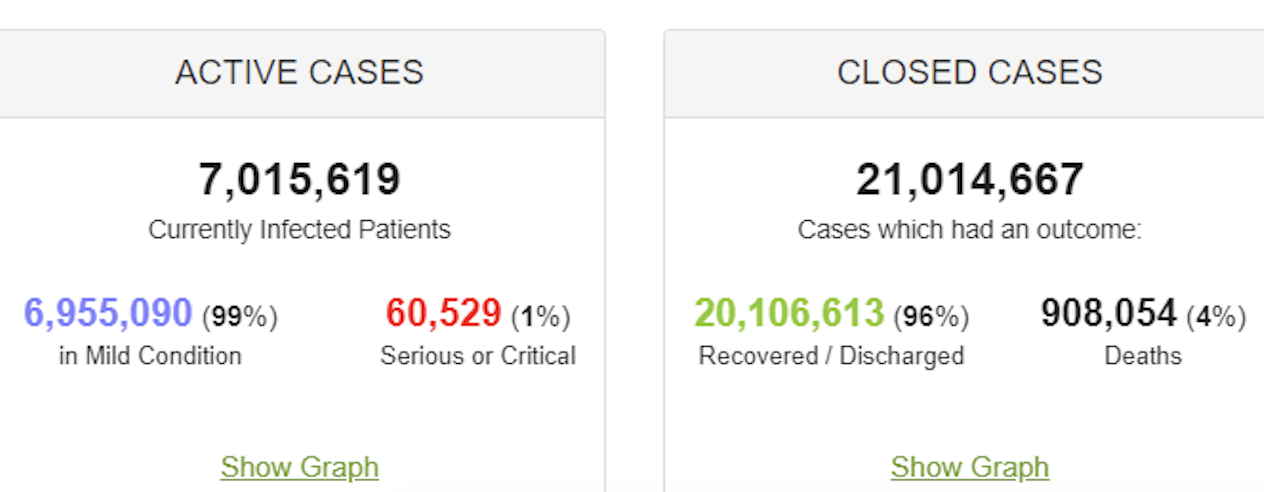

|
# |
Country, |
Total |
New |
Total |
|
|
World |
28,014,848 |
+286,548 |
907,304 |
|
1 |
6,549,475 |
+35,244 |
195,239 |
|
|
2 |
4,462,965 |
+95,529 |
75,091 |
|
|
3 |
4,199,332 |
+34,208 |
128,653 |
|
|
4 |
1,041,007 |
+5,218 |
18,135 |
|
|
5 |
702,776 |
+6,586 |
30,236 |
|
|
6 |
686,856 |
+7,343 |
22,053 |
|
|
7 |
642,860 |
+5,351 |
68,484 |
|
|
8 |
642,431 |
+1,990 |
15,168 |
|
|
9 |
543,379 |
+8,866 |
29,628 |
|
|
10 |
512,293 |
+12,259 |
10,658 |
|
|
11 |
427,027 |
+1,486 |
11,702 |
|
|
12 |
393,425 |
+2,313 |
22,669 |
|
|
13 |
355,219 |
+2,659 |
41,594 |
|
|
14 |
344,101 |
+8,577 |
30,794 |
|
|
15 |
331,078 |
+1,827 |
4,593 |
|
|
16 |
323,012 |
+775 |
4,165 |
|
|
17 |
299,659 |
+426 |
6,359 |
|
|
18 |
284,943 |
+1,673 |
6,837 |
|
|
19 |
281,583 |
+1,434 |
35,577 |
|
|
20 |
273,821 |
+4,243 |
7,732 |
|
|
21 |
256,349 |
+1,393 |
9,410 |
|
|
22 |
245,143 |
+3,176 |
3,986 |
|
|
23 |
203,342 |
+3,307 |
8,336 |
|
|
24 |
143,030 |
+2,551 |
2,979 |
|
|
25 |
141,097 |
+3,532 |
1,054 |
|
|
26 |
134,294 |
+546 |
9,155 |
|
|
27 |
122,308 |
+704 |
7,097 |
|
|
28 |
120,846 |
+267 |
205 |
|
|
29 |
112,166 |
+1,409 |
10,701 |
|
|
30 |
106,498 |
+73 |
1,634 |
|
|
31 |
Dominican |
100,937 |
+806 |
1,914 |
|
32 |
100,403 |
+175 |
5,577 |
|
|
33 |
99,042 |
+635 |
2,116 |
|
|
34 |
98,304 |
+1,271 |
4,018 |
|
|
35 |
92,082 |
+838 |
552 |
|
|
36 |
89,141 |
+372 |
9,912 |
|
|
37 |
87,939 |
+349 |
751 |
|
|
38 |
85,880 |
+173 |
5,842 |
|
|
39 |
85,146 |
+2 |
4,634 |
|
|
40 |
79,622 |
+901 |
2,897 |
|
|
41 |
77,878 |
+2,157 |
1,453 |
|
|
42 |
77,688 |
+1,140 |
6,246 |
|
|
43 |
75,981 |
+883 |
393 |
|
|
44 |
73,402 |
+194 |
726 |
|
|
45 |
72,726 |
+492 |
1,393 |
|
|
46 |
71,947 |
+421 |
2,147 |
|
|
47 |
65,218 |
+404 |
2,034 |
|
|
48 |
61,700 |
+916 |
966 |
|
|
49 |
61,541 |
+646 |
1,849 |
|
|
50 |
57,450 |
+672 |
203 |
|
|
51 |
57,166 |
+75 |
27 |
|
|
52 |
56,751 |
+1,188 |
452 |
|
|
53 |
55,632 |
+176 |
1,070 |
|
|
54 |
51,224 |
+1,327 |
543 |
|
|
55 |
49,219 |
+1,081 |
312 |
|
|
56 |
47,216 |
+278 |
1,581 |
|
|
57 |
45,313 |
+301 |
283 |
|
|
59 |
45,152 |
+199 |
905 |
|
|
60 |
44,930 |
+649 |
366 |
|
|
61 |
44,613 |
+87 |
1,061 |
|
|
62 |
41,144 |
+588 |
1,096 |
|
|
64 |
37,732 |
+175 |
555 |
|
|
65 |
35,460 |
+104 |
607 |
|
|
66 |
32,078 |
+84 |
728 |
|
|
67 |
31,036 |
+1,159 |
444 |
|
|
68 |
30,583 |
+502 |
747 |
|
|
69 |
30,164 |
+84 |
1,781 |
|
|
70 |
27,919 |
+556 |
192 |
|
|
71 |
26,602 |
+91 |
770 |
|
|
72 |
26,465 |
+91 |
781 |
|
|
73 |
25,026 |
+812 |
474 |
|
|
75 |
21,877 |
+553 |
212 |
|
|
76 |
21,588 |
+156 |
344 |
|
|
77 |
20,462 |
+879 |
324 |
|
|
79 |
18,815 |
+37 |
119 |
|
|
80 |
18,607 |
+251 |
628 |
|
|
81 |
17,435 |
+122 |
702 |
|
|
82 |
15,520 |
+85 |
206 |
|
|
83 |
15,293 |
+67 |
634 |
|
|
84 |
14,102 |
+58 |
293 |
|
|
85 |
13,437 |
+0 |
833 |
|
|
86 |
13,112 |
+160 |
300 |
|
|
87 |
12,626 |
+341 |
206 |
|
|
88 |
12,080 |
+248 |
293 |
|
|
89 |
11,746 |
+122 |
264 |
|
|
90 |
10,704 |
+151 |
322 |
|
|
91 |
10,324 |
+32 |
260 |
|
|
93 |
9,715 |
+411 |
628 |
|
|
94 |
9,583 |
+24 |
128 |
|
|
95 |
9,418 |
+31 |
62 |
|
|
96 |
9,108 |
+180 |
93 |
|
|
97 |
8,899 |
+39 |
71 |
|
|
98 |
8,834 |
+93 |
31 |
|
|
100 |
8,430 |
+93 |
337 |
|
|
102 |
7,429 |
+41 |
222 |
|
|
104 |
7,023 |
+49 |
124 |
|
|
105 |
6,094 |
+219 |
114 |
|
|
106 |
5,653 |
+23 |
176 |
|
|
110 |
4,936 |
+32 |
97 |
|
|
111 |
4,902 |
+6 |
99 |
|
|
113 |
4,888 |
+161 |
37 |
|
|
116 |
4,736 |
+1 |
62 |
|
|
118 |
4,460 |
+21 |
21 |
|
|
119 |
4,459 |
+82 |
104 |
|
|
120 |
4,447 |
+28 |
92 |
|
|
121 |
4,101 |
+201 |
46 |
|
|
122 |
3,447 |
+1 |
58 |
|
|
127 |
3,312 |
+79 |
135 |
|
|
133 |
2,730 |
+141 |
15 |
|
|
154 |
1,514 |
+3 |
22 |
From CNN's Paul LeBlanc
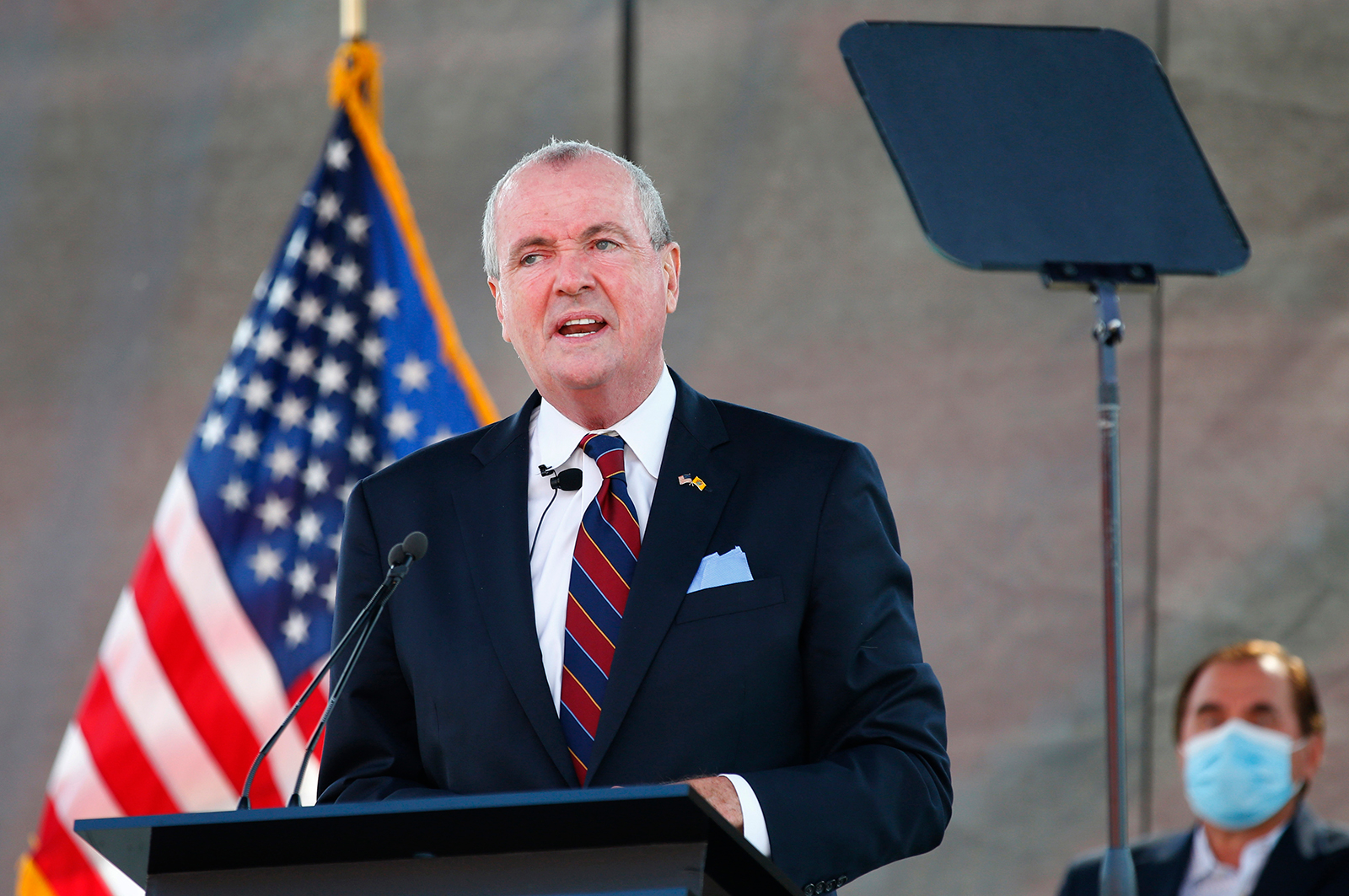
In this file photo, New Jersey Gov. Phil Murphy speaks at Rutgers University in Piscataway, New Jersey on August 25. Noah K. Murray/AP
New Jersey Gov. Phil Murphy said Wednesday he would have taken more aggressive action to fight Covid-19 if US President Donald Trump had been more honest about the true threat of coronavirus during the early days of the pandemic.
Murphy's comments come after CNN obtained audio tapes of Trump telling legendary journalist Bob Woodward that he knew weeks before the first confirmed US coronavirus death that the virus was dangerous, airborne, highly contagious and "more deadly than even your strenuous flus," and that he repeatedly played it down publicly.
Murphy said Wednesday had he known -- as Trump did -- that the virus was airborne, he would've taken steps earlier to protect his state.
"If we had known that earlier, we would have shut the state meaningfully earlier. We would have gone to a mandatory masking policy meaningfully earlier. We would have had a stay-at-home mandate put in place, all of which we did and we did it about as early as any American state but we would have done it earlier and undoubtedly would have saved lives," he said in an interview with CNN's Pam Brown on "The Lead."
"I can't tell you, as I sit here, how many we would have saved, but there's no question in my mind we would have saved lives."
Opinion from Michael Bociurkiw
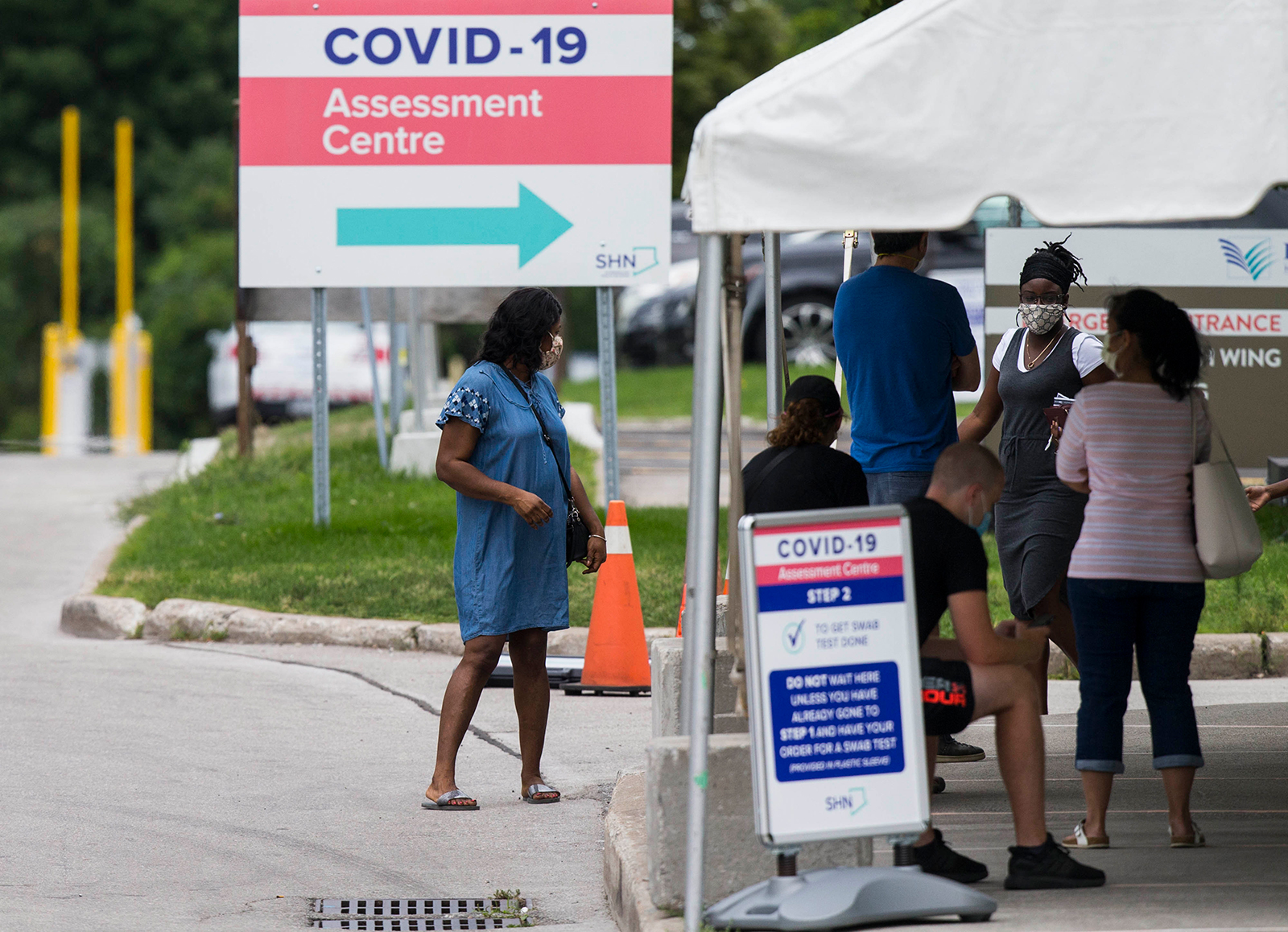
People wearing face masks line up for testing at a Covid-19 assessment center in Toronto, on August 11. Zou Zheng/Xinhua/Getty Images
Editor's note: Michael Bociurkiw is a global affairs analyst and a former spokesman for the Organization for Security and Cooperation in Europe. The opinions expressed in this commentary are his.
There are a number of theories as to why Canada has managed to flatten the Covid-19 curve much better than the United States. One is that Canadians, who entered confederation with the motto "peace, order and good government" are much more compliant than our southern neighbors with their attachment to "life, liberty and the pursuit of happiness" -- even if it means potentially killing others by refusing to wear masks in the name of freedom.
"A lot of Canadians are rule-followers. If you're at the bank and there's three tellers open everybody gets in line behind one teller and waits for their turn to be called. We are very, for the most part, rule followers -- especially in Ottawa," Sarah Chown, the managing partner of Metropolitan Brasserie in Ottawa and local chair of the Ontario Restaurant, Hotel and Motel Association, told me.
It can also be argued that the federal and provincial governments enabled Canadians to respect lockdowns and stay at home by offering unprecedented and generous financial aid from early on -- including up to C$2000 per month for Canadians out of work, as well as more time to pay taxes and mortgage payment deferrals, allowances for seniors, and wage subsidies for businesses -- all a far cry from the limited amounts offered south of the border. Even the media received a C$30 million handout from Ottawa in the form of forgiveness of broadcasting fees.
In all, the Covid-19 measures helped push the federal deficit to C$343.2 billion this year and the federal debt past the C$1 trillion mark for the first time, former federal Finance Minister Bill Morneau said in July.
And all that is on top of free public health care, including free testing.
"If compliance means personal or business bankruptcy, people will ignore orders such as lockdowns. I suspect that's part of the American Covid-19 story in certain regions," Canadian political analyst Yaroslav Baran told me.
From CNN's Chandler Thornton
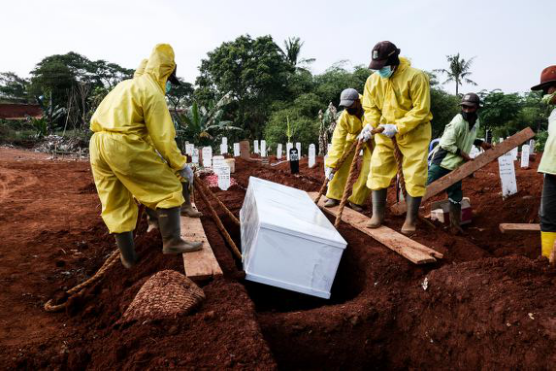
Funeral workers wearing protective suits bury a Covid-19 victim at Pondok Ranggon cemetery in Jakarta, Indonesia, on September 9. Anton Raharjo/Anadolu Agency/Getty Images
Jakarta is putting the "emergency brakes" on relaxing coronavirus restrictions and instead reimposing strict measures, the Indonesian capital's governor said, according to state news agency Antara.
"Considering the emergency situation in Jakarta, there are no other choices but to put the emergency brakes. This means that we have to implement the PSBB (large-scale restrictions) as it was in the beginning of the pandemic. This is the emergency brake that we have to pull," Jakarta Gov. Anies Baswedan said at a news conference Wednesday.
The governor said his decision was based on three factors, Anatara reported:
"In the past two weeks, mortality rates have spiked back up. In terms of percentage, they may still be considerably low, but in terms of the numbers, they have gone back up. The availability of beds is at maximum capacity and they may be fully filled by the end of the month, if there are no restrictions," Baswedan said.
The new measures will go into effect September 14, according to Antara.
Jakarta's government reported that 12.2% of those tested for Covid-19 in the city last week tested positive. The city, home to more than 10 million people, has confirmed a total of 49,837 Covid-19 infections. That's nearly a quarter of Indonesia's total number of cases, according to government figures.
Jakarta's death toll from the virus is 1,347. Indonesia's nationwide death toll is 8,336, according to Johns Hopkins University.
From CNN's Chandler Thornton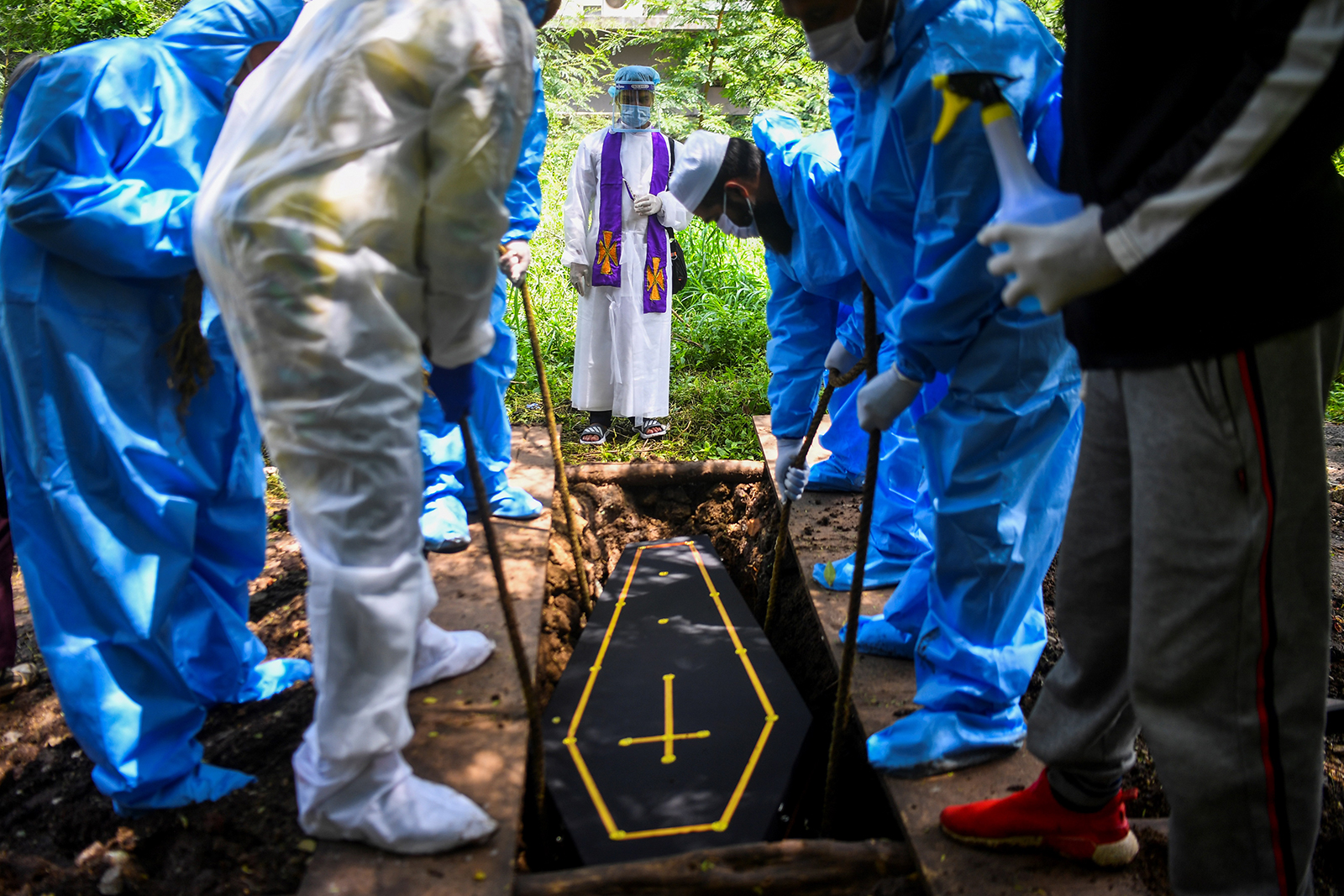
Volunteers from a Muslim and a Christian group lower the coffin of a Covid-19 victim at a cemetery in Pune, India, on September 7. Indranil Mukherjee/AFP/Getty Images
The global death toll from the novel coronavirus surpassed 900,000 on Wednesday evening, according to Johns Hopkins University's tally.
There have been at least 900,239 deaths worldwide. The United States has accounted for at least 190,784 coronavirus-related deaths, the most around the world.
The total number of confirmed Covid-19 cases around the world stands at 27,719,952, according to the university.
Retrieved from: https://edition.cnn.com/world/live-news/coronavirus-pandemic-09-10-20-intl/index.html
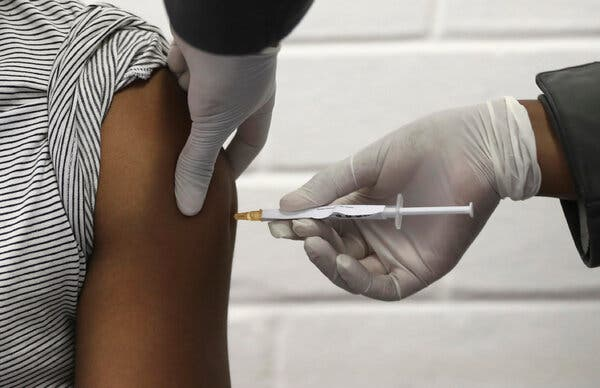
A volunteer in Johannesburg, South Africa, participating in the vaccine trial developed at the University of Oxford in Britain in conjunction with the pharmaceutical company AstraZeneca.Credit...Pool photo by Siphiwe Sibeko
AstraZeneca, a front-runner company in the race to develop a coronavirus vaccine, on Tuesday announced a global pause in late-stage trials for its product because of a suspected adverse event.
Several individuals familiar with the event, who spoke on the condition of anonymity, said that an individual in Britain who was enrolled in a Phase 2/3 trial had experienced symptoms consistent with a condition called transverse myelitis, or inflammation of the spinal cord.
The trial’s suspension will allow an independent board of experts to determine whether the participant’s condition was linked to the vaccine or merely coincidental, said Saad Omer, a vaccine expert at Yale University.
Part of this process will include generating a timeline of the participant’s symptoms to see if they match up roughly with when the vaccine was administered. The committee will also investigate other potential causes of the symptoms, in a process of elimination. After determining whether AstraZeneca’s vaccine is a probable culprit, experts will advise the company on whether to resume their trials.
In the interim, no further doses of the vaccine will be administered. It remains unclear how long the evaluation process will take. AstraZeneca representatives did not respond to repeated requests for comment and clarification.
The suspension is the second time that AstraZeneca has halted coronavirus vaccine administration in Britain because of severe neurological symptoms, according to information sheets uploaded to a clinical trial registry that was first reported by Nature News. Another participant developed symptoms of transverse myelitis, researchers reported in July, and was later diagnosed with an “unrelated neurological illness.” After a safety review, trials resumed.
Transverse myelitis is relatively rare, prompting symptoms in roughly 1,400 people each year in the United States, according to the National Institutes of Health. Its root cause is often mysterious, although doctors believe that the syndrome generally results when inflammatory responses in the body go awry, sometimes in response to an ongoing or past infection, said Dr. Felicia Chow, a neurologist at the University of California, San Francisco. “It’s not uncommon that we never figure out the cause,” Dr. Chow said.
There has been some past speculation that vaccines might be able to cause transverse myelitis, she added, but “there’s never been really any clear-cut, definitive proof.”
Should other participants in the AstraZeneca trials develop symptoms consistent with transverse myelitis, “that would raise these questions again,” Dr. Chow said.
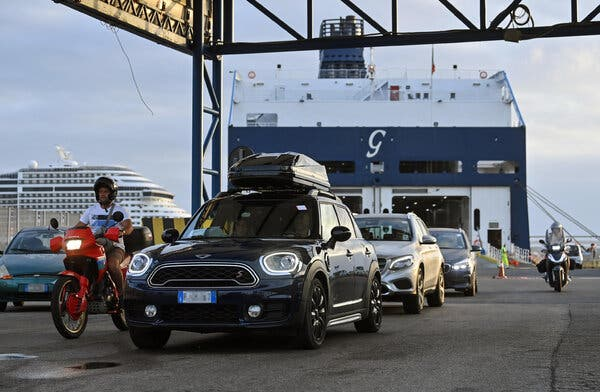
Passengers from Sardinia wait to get tested after arriving at the Civitavecchia port near Rome.Credit...Riccardo Antimiani/EPA, via Shutterstock
The former Italian prime minister Silvio Berlusconi was on Sardinia in August, as was his friend, the club owner Flavio Briatore. Now both are among hundreds of cases linked to the island, a favorite of rich partygoers.
It is unclear when or how Mr. Berlusconi and Mr. Briatore got the virus. What is known, though, is that the number of cases on the island shot up from a few dozen before the summer to more than 1,000 in a month.
Mr. Berlusconi, 83, lies in a Milan hospital with pneumonia. Mr. Briatore, who dropped in to pay him a visit at his Sardinian estate and who had publicly complained about what he said was an overreaction by the government to the pandemic, is quarantined.
In March, as cases and deaths exploded in the Italy’s north, the southern island’s governor, Christian Solinas, pleaded with the authorities in Rome to ban travel to Sardinia. The government obliged. For months, the island staved off the worst.
But August has been Sardinia’s hot season since the 1960s, and not even the pandemic could stop it.
Roberto Ragnedda, the mayor of the Sardinian town of Arzachena, said “10 days of madness” in August had caused “enormous damage to our image and to economy.”
Retrieved from: https://www.nytimes.com/2020/09/09/world/covid-coronavirus.html?auth=login-google